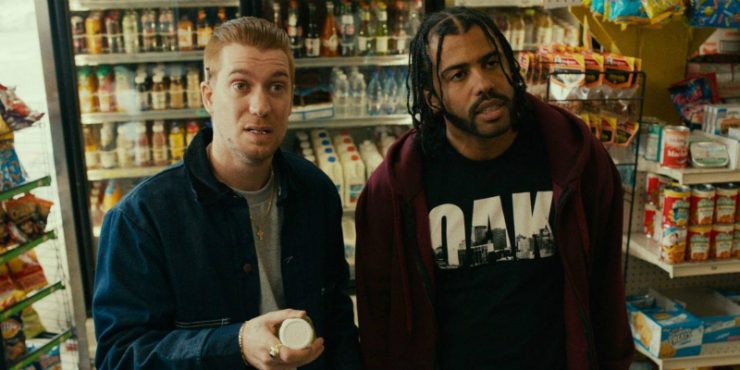The creeping, sometimes translucent tentacles of gentrification make their way through the streets of Oakland, California in the new film Blindspotting, which stars original Hamilton cast member Daveed Diggs and Rafael Casal – the two actors also wrote the script. Diggs and Casal grew up in Oakland, and Blindspotting is their passion project. It took them over a decade to produce and finally release. The film is part comedy and tragedy, part ragged urban tale and part surreal performance art. Its screenplay is filled with heavy-handed metaphors – visually and narratively – but they’re heavy because they are weighted with the gravity of lived experience. Blindspotting attempts to make a radical document of a city in shift, and how it effects all in involved, especially its most tenured residents. The result is an exuberant – if occasionally uneven – experience, tinged with mourning for a culture struggling to survive.
Diggs plays Collin, a convicted felon with three days left of a twelve-month probation. He drives a moving van with his childhood friend Miles (Casal), a slick-haired white boy with a shiny grill and a flair for selling anything to anybody who might want a piece. Miles is also a trouble-maker, a sharp-tongued tough guy who moves mountains for his family and friends, but is outright hostile toward nearly anyone else. The key to Miles’ anger comes from what is happening to Oakland: bodegas selling wheatgrass juice bottles, silicon valley tech bros taking up shop. Collin loves Miles but he also does his best to avoid the tension, just trying to make it out of probation and back to being a free man. Until Collin is an unfortunate witness to a white police officer (played inexplicably by Ethan Embry) shooting a black man in the back four times, not even a second after the cries of ‘Don’t Shoot!’.
We’ve seen this story before, you might be thinking. We’ve even seen it in Oakland before, when Ryan Coogler’s 2013 film Fruitvale Station dramatized the final, tragic day of Oscar Grant. Two trailers before my screening of Blindspotting were for dramas about police killing unarmed people of color. So yes, Blindspotting does tackle some well-worn contemporary material, but Diggs and Casal are much more creative than to make another procedural drama. Despite its basic premise, the film’s screenplay is littered with acrobatic wit, often directly juxtaposed against Collin’s anxiety with trying to survive within his own town. Blindspotting‘s tonal shifts are part of its whiplash aesthetic, it lulls you in with sharp humor, surprise guest appearances from nineties television personalities (Hello Tisha Campbell-Martin! What are you doing here, Wayne Knight!?), before hitting you with its sobering message.
Blindspotting is the kind of movie made with so much passion and enthusiasm that its hard for it to settle for just one message. Nor should it feel obliged to. It tries to counter the entire scope of gentrification, not simply lampooning kale smoothies and avocado toast, but the way it shatters identities, causes rifts within families, allows local institutions to die. People like Collin are always told about all the good that change in their city will bring: better restaurants, better schools, more access to the finer things in life. This argument even comes from Oakland natives, like his mother Nancy (Margo Hall), and his ex-girlfriend Val (Janina Gavankar). Val, who left Collin after his stint in jail, pleads with Collin to abandon his old life, even his friendship with Miles, to embrace lifestyle changes, even if its complicit with a changing Oakland. But how can Collin accept that change when he still has to watch an officer take aim at the back of a fleeing black man?
Miles has his own family, including his wife Ashley (Jasmine Cephas Jones, also of Hamilton fame) and their young son named Sean (Ziggy Baitinger). Even with a child, Miles is more resistant to positive lifestyle changes than even Collin. As a white man, Miles’ quibbles with gentrification are more than complicated, they’re inherently contradictory. His fight for the old Oakland is a remnant of his fight to get accepted within it in the first place. He sees his whiteness as a demerit in his DNA, but he has spent such a long time disavowing his own privilege that he no longer realizes that he still has it. Miles is Blindspotting‘s trickiest character, no doubt the film’s most alarming tightrope act. Casal’s performance is certainly funny and even has its moments of profundity, but whether he is meant to represent the versatility of Oakland culture or malevolent whiteness (or both) is something the film never really resolves.
The film is directed by Carlos López Estrada – his first feature – with a showman’s flair and a solid understanding of the power of evocative editing. López Estrada is a Mexican-American born in Mexico City, and he imbues Blindspotting with a constant feeling of otherness, of alienation from the very neighborhood that made you who you are. The film’s final showdown is an act of complete and total catharsis, a scenario that really stretches the borders of credibility not only in reality but even in the chaotic universe López Estrada has created with Diggs and Casal. Like a lot of moments in Blindspotting, the intention outweighs the execution. I quite enjoyed this film, its perseverance in being an entertainment even in the face of darker themes felt unique in the current state of feel-bad indies. Its hammer is not as heavy as it should be from time to time, but its rhythms and beats are sincere, without judgment and incessant in its pleads for a more humane society.
Directed by Carlos López Estrada










